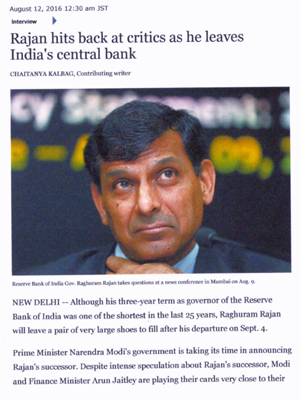Rajan hits back at critics as he leaves India’s central bank 2
Published date: 12th Aug 2016, Onlooker
View PDFCHAITANYA KALBAG, contributing writerÂ
NEW DELHI — Although his three-year term as governor of the Reserve Bank of India was one of the shortest in the last 25 years, Raghuram Rajan will leave a pair of very large shoes to fill after his departure on Sept. 4. Â
Prime Minister Narendra Modi’s government is taking its time in announcing Rajan’s successor. Despite intense speculation about Rajan’s successor, Modi and Finance Minister Arun Jaitley are playing their cards very close to their chests. Â
On the question of on who could succeed him, Rajan told the Nikkei Asian Review in an exclusive interview on Aug. 11 that there was no single formula in finding his replacement. Â
“Sometimes what is needed is somebody who’s going to maintain the system and stabilize the system and build on it, and sometimes who you need is somebody who will shake up the system. So, I think that those things can vary depending on the time,” he said.Â
At 53, Rajan was one of the youngest ever Indian central bank governors and was seen as one of the most outspoken and controversial. Â
Among candidates mentioned as potential successors are Urjit Patel, 52, one of the central bank’s deputy governors and a respected economist; Arvind Panagariya, 63, the vice-chairman of the government’s policy think tank, the National Institute for Transforming India, and a former Columbia University professor; Arundhati Bhattacharya, 60, who heads the State Bank of India, the country’s largest bank; Rakesh Mohan, 68, another prominent economist and former RBI deputy governor; and Subir Gokarn, 56, India’s executive director on the International Monetary Fund board, a respected economist and former RBI deputy governor. Â
In the past, RBI governors have come from within the central bank’s own ranks or from the country’s financial bureaucracy. Rajan was a former IMF chief economist who acquired “star” status when he accurately predicted the global financial crisis of 2008, although his warnings were seen as controversial ahead of the crisis. Â
There is little doubt that Rajan, a prolific speaker, was one of the most outspoken and controversial central bankers India has seen – and drew considerable flak because of his forthright views. His outsider status drove some of his more pointed comments on touchy subjects such as crony capitalism, once rampant but now much subdued, or even about tolerance under a government perceived as right-wing and hewing to a Hindu majoritarianism. Â
In his interview with NAR, Rajan was at pains to dispel the impression that he was a relentless critic of the Modi government. “I would say first that I haven’t been a firm critic of the government as has been sometimes portrayed. I have been somebody who has warned or cajoled about the direction of economic policy, absolutely. I think that has been done with the broader intent of macro[economic] stability that the RBI has firmly a mandate [for],” he said. Rajan appeared to blame a headline-hungry press for studying and analyzing every word he uttered at the RBI and sometimes taking his comments out of context to make him sound like he was criticizing the government.Â
Â





